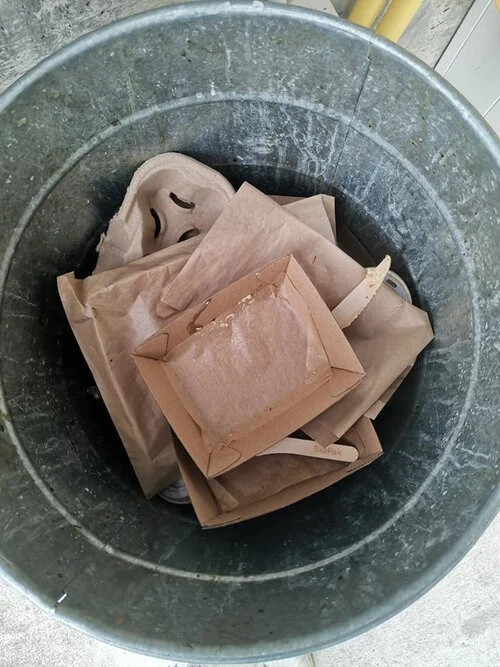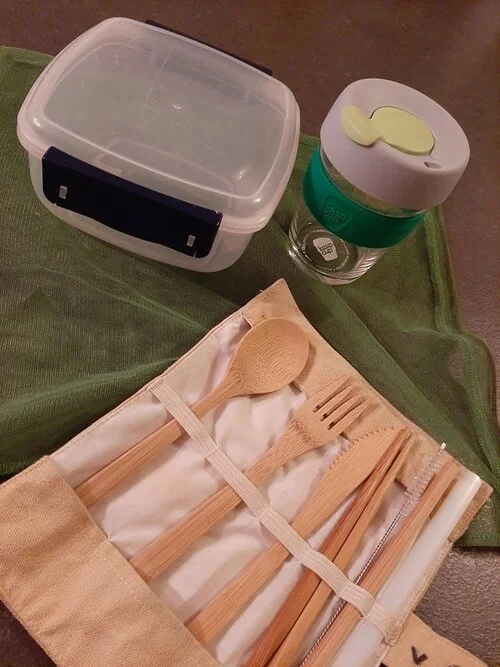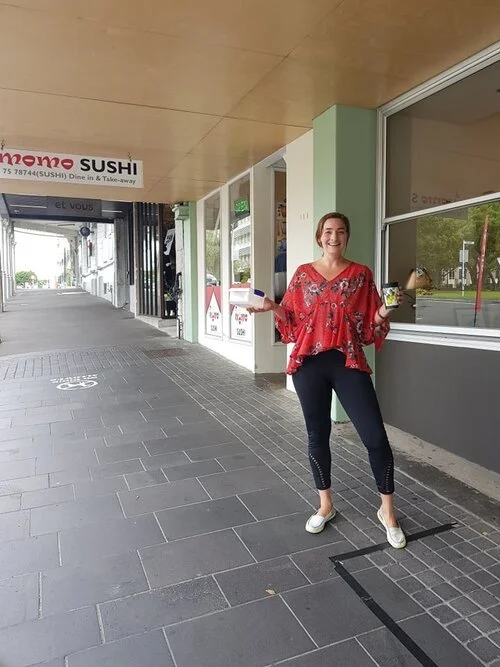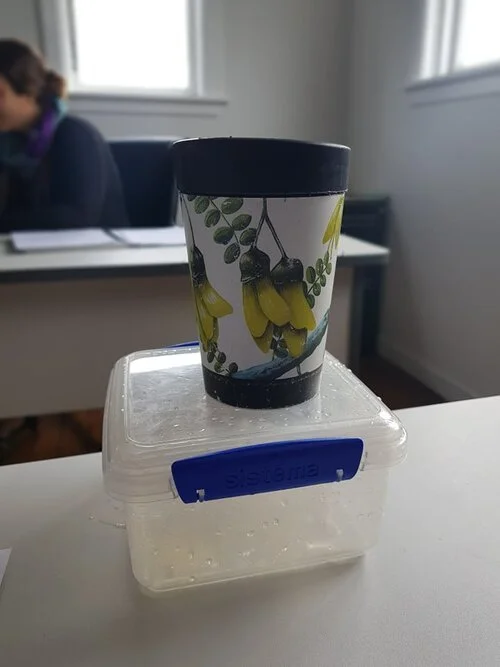Takeaway Throwaways Taranaki
Single-use takeaway containers are a big issue, so it’s no surprise that businesses have come up with ideas to reduce their waste and bring awareness to the alternatives. Some coffee shops, food stalls, and sushi storefronts, for instance, are meeting their customers halfway by providing compostable containers. But is this solving the problem, or creating a bigger one?
The issue arises when containers are not disposed of correctly, such as the ubiquitous coffee cup and plastic lid. A cup and compostable lid can be composted if it is compostable and does not have a plastic liner. But a plastic-lined cup and plastic lid need to go to landfill. Neither type can be recycled. Making a habit of bringing our own containers, coffee cups, and utensils when eating out, and working as a community towards single-use takeaway abstinence altogether is the best solution.
Zero-Waste Education, Elvisa’s reusable takeaway kit.
It can get quite confusing so we’ve put together a quick explanation below. Read Takeaways Containers, Explained for a further “breakdown.”
Polystyrene is not recyclable in kerbside bins, so goes straight to landfill, and all polystyrene food and drink containers will also be phased out by late 2022. Clean soft plastic can only be recycled in soft plastic recycling bins at Countdown supermarkets.
Plastics 1, 2 & 5 can be recycled in kerbside bins only if plastic food boxes are clean.
Compostable Plastic, PLA or bio-plastics are the most confusing because they need a commercial composting facility to break down. Also, they are not acceptable in our kerbside food waste bins.
While compostable plastics reduce the demand for fossil fuel-based plastics, if they go to landfill, they release harmful greenhouse gases. Degradable plastics are being phased out in Australia.
Degradable plastics will also be phased out in NZ from late 2022.
Unlined and uncoated paperboard, sugarcane or bamboo takeaway boxes can be composted at home (they should not be recycled if they are food-stained). However, sending cardboard to landfill is harmful because organic matter emits greenhouse gases and creates leachate, a liquid byproduct that can leak into our waterways.
Many cafes and consumers are easily confused by paperboard boxes that are actually lined with polyethylene, a plastic. These boxes should not be composted or recycled but sent to landfill.
While there are good intentions out there, no option is as good as avoiding single-use containers altogether. Reuse, be prepared, and plan ahead. Dine-in, instead of getting takeaways.
Learn more about the NPDC’s Bringit! Campaign and types of reusable coffee cups to suit your lifestyle.
Sustainable Taranaki is working with local businesses to help them find positive solutions to any waste, recycling, and/or composting challenges that they may have put into the "too hard basket.”
If you or a business you know would benefit from our team's services, please email info@sustainabletaranaki.org.nz.
Sustainable Taranaki Communications Manager, Brittany, standing outside of our office with her reusable coffee cup and takeaway food container.
So, what can you do?
Bring your own cup! All cafés are able to accept clean cups under the Food Act and more than 35 local cafés offer a discount when you bring your own. Keep an eye out for the posters coming from mid-March!
Encourage your local café to promote reusable cups. Some ideas can be to have a mug library or to join a successful cup lending scheme, such as Again Again.
Avoid takeaways altogether. Make time to have a seat, enjoy the view or have a nice chat.
Start the conversation. Bring attention to your friends and colleagues about the differences in takeaway materials, and think of ways to reduce your waste and not impact the environment.
Learn and get involved. There are lots of things happening across Aotearoa that look at reducing single-use takeaway containers. You’ve probably heard of Takeaway Throwaways, UYO, Incafe’s 4evercup, Again Again or similar initiatives. Read a bit more about WHY it’s important to reuse here.
Ask your local café about their plan for disposing of the commercially compostable cups they hand out. Do they have a commercial compost collection?
Dispose of cups properly. If it’s a compostable cup and there’s no commercially composting bin around, make sure you don’t contaminate the recycling bins. Single-use coffee cups are not recyclable. That’s it. Put them in the landfill bin instead. Read more in our Takeaway Containers, Explained.
An article from Stuff also talks about the confusion of compostable plastics and the reality of New Zealand home compost systems: Does compostable plastic break down in a home compost system?




